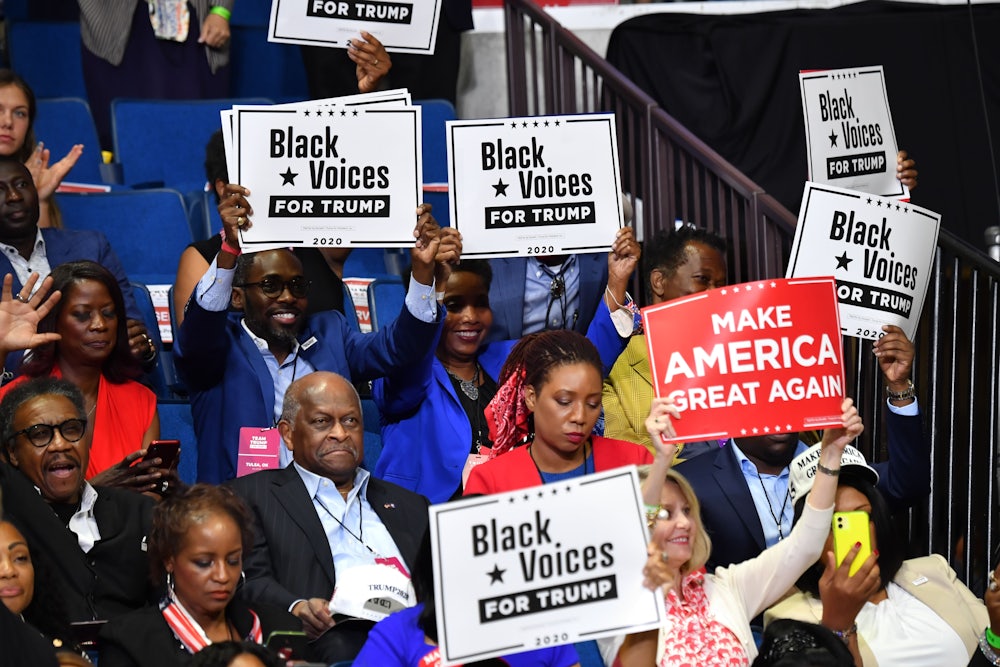How did Herman Cain die? Tweets commemorating the former presidential candidate and pizza magnate, including from President Donald Trump, Rudy Giuliani, and Press Secretary Kayleigh McEnany, didn’t mention a cause of death. They said he was an “American success story” and a “great friend” who just happened to die of … something.
As someone who briefly led the Republican presidential primary in 2012, Cain is arguably the most famous American to die of Covid-19. He was also an inveterate culture warrior who opposed mask mandates and amplified skepticism of the dangers of coronavirus. Nine days before he tested positive for the virus, he was filmed without a mask in a tight crowd at Donald Trump’s Tulsa rally. (At least eight White House staffers involved in the rally have tested positive for the virus.) It is entirely reasonable to propose that Trump, as well as the entire Republican industry built around resisting basic anti-virus safety protocols, bear some responsibility for his preventable death.
But that is a bridge that gets a little too close to reality for Republican politicians and their allies in conservative media, which have claimed that liberals have been polluting Cain’s memory by politicizing it. As usual, they got it backwards.
Between hawking brain pills, Ben Shapiro made the case that people who wear masks also die. “There are plenty of people dying of this who have been wearing masks and have been being careful,” he said. “So spare me some of the crocodile tears on behalf of people who really are not happy with Herman Cain’s politics.” Within minutes of Cain’s death, the right-wing website The Blaze had collected a series of tweets from people pointing out a simple fact—that the former presidential candidate had died of coronavirus—titled, “Liberals waste absolutely zero time politicizing Herman Cain’s death and blaming Trump.”
The Washington Examiner’s Byron York, meanwhile, told his readers to “ignore” the fact that Cain had died from Covid-19. “Like everything else these days,” he wrote, Cain’s death was “immediately discussed in a Trump-anti-Trump context.” It would be preferable and more humane, he insisted, to use Cain’s death as “an occasion to ... remember Herman Cain.” For York, this included a conversation the two had about pizza crusts during the 2012 campaign.
New: Remembering Herman Cain. Instead of using his death as an occasion to bash Trump, why not just remember Herman Cain? https://t.co/7Nhy2xJvrW pic.twitter.com/GNsWMMyx8y
— Byron York (@ByronYork) July 31, 2020
But Cain’s legacy is directly tied to Trump and the anti-science, anti-elitist politics that likely contributed to his death. His own political rise presaged Trump’s. Beyond a core tax policy that would have bankrupted the Treasury (“9-9-9”), he had no real policy portfolio to speak of in 2012. He largely seemed to be making it all up as he went along—his famous quip that he didn’t care who the president of “U-beky-beky-becky-stan-stan” was summed up his ethos, which privileged the authentic over the prepared. He was a businessman who believed that all of America’s problems could be solved by running the country like a mediocre regional pizza chain.
He also made his bones playing to the party’s ravenous base. His campaign promises were downright Trump-y. He was unapologetically Islamophobic, pledging not to appoint a Muslim to his cabinet. He said he would build a 20-foot electrified fence on the southern border that would kill anyone who attempted to cross into the country. Ta-Nehisi Coates at the time observed, “I can’t really recall a candidate—in recent memory—that was as bigoted as Herman Cain.”
Cain’s death was as political as his life was. We don’t know—and may never know—exactly how he contracted the coronavirus. But the idea that his attendance at Trump’s Tulsa rally is purely incidental is absurd. Cain, like Trump, has flouted the recommendations of public health officials. His politics contributed to his death, even if he contracted the virus somewhere other than Tulsa.
Those attempting to wall off “politics” from Cain’s death aren’t doing it to protect Cain. They’re doing it to protect Trump. Trump’s failure to organize America’s response to the virus has led to more than 150,000 deaths. Trump’s megalomania led him to hold an indoor rally in Oklahoma at a time when coronavirus cases were surging. Trump’s decision to turn basic precautions, like the wearing of face masks, into culture-war issues have only made the problem more difficult to resolve. It’s worth noting that Trump politicized Cain’s death as well. Asked about Cain on Thursday, he didn’t offer a eulogy. “Unfortunately,” Trump said, “he passed away from a thing called the China virus.”
